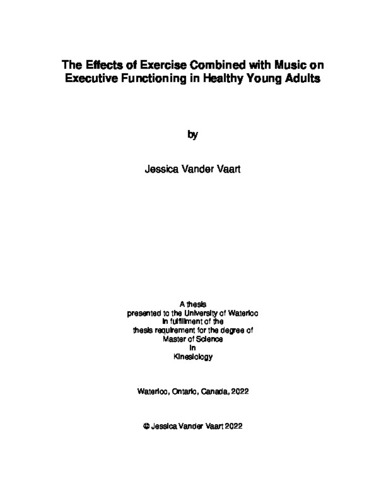| dc.description.abstract | Evidence suggests that both exercise and music improve cognitive functioning. While many individuals listen to music while exercising, whether exercise combined with music produces greater effects on cognitive functioning compared to either method alone is not well understood. This study examined changes in executive functioning (inhibitory control, working memory) in healthy young adults after exercise with music compared to music listening only and exercise only. It was hypothesized that exercise combined with music would show greater improvements in inhibitory control and working memory compared to exercise or music only. Using a repeated measures design, 24 young healthy adults completed three counterbalanced sessions (exercise with music, exercise, and music). Prior to and following the interventions, participants performed assessments for inhibitory control and working memory. The assessments included a Stroop task to assess inhibitory control and a reverse Corsi block task to assess visuospatial working memory. Additionally, affect was assessed pre and post activity using the Physical Activity Affect Scale (PAAS). The data was analyzed using a linear mixed model to compare the effects of exercise with music, music only, and exercise only on cognitive functioning with factors for time (pre/post) and intervention (exercise with music, exercise, music), as well as session number (1, 2,3) to adjust for learning effects within and across sessions.
This study found that working memory improved significantly across time however, the magnitude of changes did not differ significantly between the different conditions. Similarly, improvements in positive affect and fatigue were significant across
time for all conditions but these changes did not differ significantly between conditions. No significant changes were observed for inhibitory control across time or condition. The results of this study suggest that exercise combined with music does not provide any additive benefit to working memory, inhibitory control, or affect when compared to either exercise or music listening. Instead, it appears that all three conditions (exercise with music, exercise, music listening) resulted in similar changes to components of cognitive functioning and affect across time however, these changes depend on the specific domains assessed. | en |

